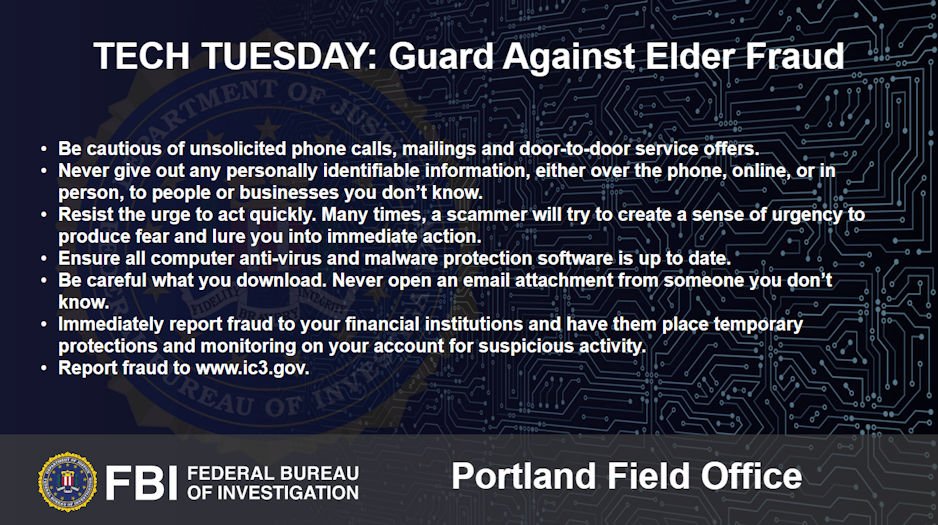Oregon FBI’s Tech Tuesday: Building a digital defense against elder fraud

PORTLAND, Ore. (KTVZ) -- This week's FBI Portland Tech Tuesday feature focuses on safeguarding you and your loved ones from elder fraud schemes.
You’re entering the final season in your life, and you’ve worked hard over the years to earn enough to live comfortably. But your nest egg could be just tempting enough to be the target of scammers looking to take it from you. The FBI, alongside other federal law enforcement and protection agencies is warning elder Americans – beware of scammers. This message also applies to those looking out for elders – many times we take care of our elders, including managing finances.
Seniors can be especially vulnerable targets to attackers – the usually have financial savings, own a home, have good credit – just to name a few. They also may be less inclined to report fraud because they are either ashamed at having been scammed or might not know how.
Some of the most common elder fraud schemes committed include romance scams – where an elder may be looking for love online and is convinced to give money to someone they’ve never met in person. Another big scam is the so-called “Grandparent scam,” where criminals pose as a relative – usually a child or grandchild and claiming to be in immediate financial need.
Tech support scams targeting elders also make up a significant number of reports compiled by the FBI’s Internet Crime Complaint Center. Other common elder fraud schemes can include government impersonation scams, fake sweepstakes and lottery scams, home repair scams and caregiver scams.
It’s important that both elders and caregivers know how to spot elder scams and ways to mitigate the risk of falling victim to one. For example, be cautious of unsolicited phone calls, mailings and door-to-door service offers. Never give out any personally identifiable information, either over the phone, online, or in person, to people or businesses you don’t know.
In addition, resist the urge to act quickly. Many times, a scammer will try to create a sense of urgency to produce fear and lure you into immediate action. Call police immediately if you feel there is danger to yourself or a loved one.
Online, there’s a few other steps you can take, like ensuring all computer anti-virus and malware protection software is up to date. Make sure to use reputable anti-virus software or have a trusted family member or friend help you set it up. Be careful what you download. Never open an email attachment from someone you don’t know and be wary of email attachments forwarded to you.
If you have become a victim or have a loved one that is, report that fraud immediately to your financial institutions and have them place temporary protections and monitoring on your account for suspicious activity. You should also report the scheme to the FBI via the Internet Crime Complaint Center at ic3.gov. When reporting, include as many details as possible, such as the name of the scammer or company, dates of contact, and communications made, any payments made, and so on. And remember to preserve any original documentation or communication with the scammer.
Scammers will continue to try to take advantage of you. Make sure you’re doing all you can to protect yourself from becoming a victim.
_________________________________
Sourcing:
https://www.fbi.gov/scams-and-safety/common-scams-and-crimes/elder-fraud